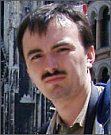Catalin Vatamanu

associated Ph.D. student
Contact
Catalin Vatamanu
Theologische Fakultät
Martin-Luther-Universität Halle-Wittenberg
Franckeplatz 1, Haus 25
06110 Halle / Saale
phone: ++49 (0) 345 / 552 30 13
fax: ++49 (0) 345 / 552 72 39
vatamanc@yahoo.com
Education in the Old Israel
Supervisor: Prof. Dr. Ernst-Joachim Waschke
The goal of my Ph.D. thesis is the history of the education in Ancient Israel on the basis of the present state of research in theology and historical education research. The topic "Education in the Old Israel" is at the same time a topic of the Biblical Exegeses and the analysis of the Hebrew and Greek terminology, in addition, an interdisciplinary study and not just theological. The main topics are based on the comparative investigation of the cultures of Israel, Egypt and Mesopotamia.
The divine and the institutionalized education represent the basis of the Hebrew Biblical society and also of our contemporary society. The family, the school, temples and the groups of intellectuals played an important role in Israel.
In the topic of my doctoral thesis, "Education in the Old Israel“, I would like to discuss the following problems:
- Divine Pedagogy - main concern of the Hagiographers of the Old Testament:
- Educational principles in the Torah;
- Development of the education in the monarchical period;
- Pedagogy of the prophets of the Old Testament;
- Aspects of the instruction and education in the post-exile literature.
- The institutionalized framework of the education in the Old Testament:
- Education in the family:
- The child as sense of the family;
- Justice as educational ideal - Development of the public education:
- Schools of the prophets, Rabbinical schools;
- The synagogue - public school and worship place - Contents and goals of the education
- Education in the family:
- Hebrew-Christian religious instruction between tradition and modern trend:
- Development of the Hebrew educational ideal
- The teachings of the Jesus Christ
- The interdependence between Theology and the permanent education
- Early Hebrew training and its meaning for today’s educational theory and practice
A chapter concerning theological instruction in the context of a secularized society will be a comparative study between religious education of the Old Testament and modern religious education.
Education and training
| since 10/2005 | scholarship from Diakonisches Werk der EKD at Martin-Luther-University Halle-Wittenberg, Faculty of Theology Project: Education and Training in Old Israel Supervisor: Prof. Dr. Ernst-Joachim Waschke |
| 10/2003 | Started to work on my PhD thesis at the Faculty of Orthodox Theology "Dumitru Staniloaie", University "Al. I. Cuza" Iasi Research field: Old Testament and Hebrew Language Project: Education and Training in Old Israel |
| 2001-2002 | Master degree in Theology at the Faculty of Orthodox Theology "Dumitru Staniloaie", University "Al. I. Cuza" Iasi Research field: Biblical Theology |
| 1997-2001 | Faculty of Orthodox Theology "Dumitru Staniloaie", University "Al. I. Cuza" Iasi Research field: Pastoral Orthodox Theology |
| 1992-1997 | High-school theological seminary "St. George" Botosani Research field: Pastoral Orthodox Theology |
Work experience
Publications
- "Mother of God in the Holy Sacrament of Extreme Unction", in Gracious Light, Review of Romanian Spirituality and Culture, Romanian Institute of Orthodox Theology and Spirituality, New York, 2003, No. 3, pages 17-24.
- "The Holiness - a Present Vocation of the Church" in Gracious Light, Review of Romanian Spirituality and Culture, Romanian Institute of Orthodox Theology and Spirituality, New York, 2004, No. 2, pages 15-17.





